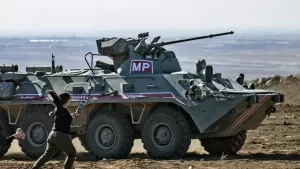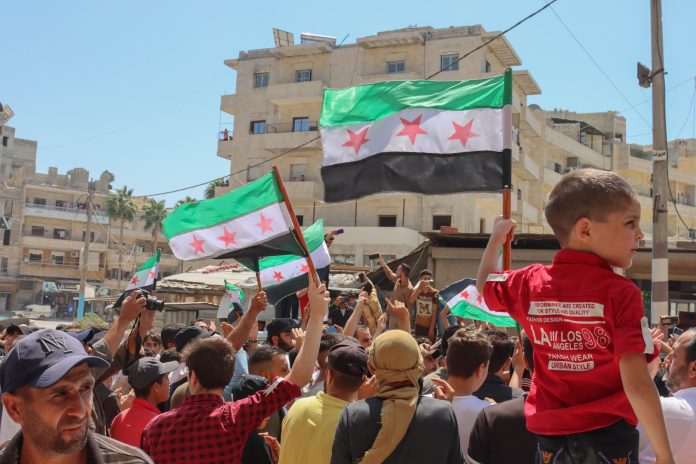Since 2019, the Turkish ultranationalist bloc and Turkish-backed Syrian National Army (SNA/TFSA) have been waiting restlessly for the Turkish state to announce a fourth invasion of Syria. Yesterday, they got the complete opposite of what they wanted to hear.
Turkish Foreign Minister Mevlut Cavusoglu told the press in Ankara on Thursday: “We need to bring the opposition and regime together for reconciliation somehow, there will be no permanent peace otherwise…To prevent the division of Syria, there must be a strong administration in Syria. The will that can dominate every corner of its lands can only be achieved through unity and solidarity.” Cavusoglu implied his “quick talks” with Syrian Foreign Minister Faisal Mekdad at the October Non-Aligned Movement summit in Belgrade influenced this idea.
The Turkish FM’s comments signal a sharp change in policy from the Turkish state’s numerous threats of a fourth invasion, which have slowed down considerably since the July 19 Tripartite Summit in Tehran. Since mid-July, the Turkish state has sent reinforcements into Syria, but has not officially threatened invasion.
Mass protests have erupted across Turkish-occupied territory in response to Cavusoglu’s latest statement, from Idlib to Jarabulus. This is not the first time mass protests condemning Turkish policies have swept across virtually every Turkish-occupied city in Syria, however. The Turkish state has frequently failed to pay the SNA its promised wages, causing a series of large protests that pop up every few months.
How do Russian relations play a role in all of this?

Analysis:
Though discussion of a possible Russian green-lighting of a Turkish invasion will continue, the likelihood of this seems to be decreasing with every new interaction between the Turkish and Russian states. Syrian and Russian forces have been militarily embedded in Rojava (Northern Syria) since 2019, and it would be complete chaos for their states’ respective geopolitical interests to suddenly pull out or be in open conflict with the Syrian Democratic Forces (SDF). Putin has consistently demanded Turkey follow the Astana peace process, a demand that seems to be gradually gaining legitimacy as the Turkish state looks to normalize relations with the Russian state.
When observing post-Soviet history under Putin, one finds that once a Russian garrison is deployed somewhere, they do not leave. Reports suggesting Russian troops have been pulled out of Northern Syria since the invasion of Ukraine are false, as the Russian garrison in Northern Syria has actually increased its personnel since February. While Turkish forces have been reinforced in Syria, so have Russian forces.
At this point it is increasingly clear that Putin sees Rojava as an asset to the Russian state, and Artsakh (Nagorno-Karabakh) as one too. Whatever Russian action happens in either region will likely happen in the other, but withdrawal seems a very unlikely one at this time.
Meanwhile, the US and CTJF-OIR Coalition have effectively become lame duck actors in Syria since the October 2019 withdrawal. Coalition relevancy has been reduced to occasional operations against ISIS cells and leaders (often within Turkish-occupied territory where these cells are harbored, it should be noted). The Russian state has taken advantage of this to expand its great power monopoly on the Syrian Civil War. That being said, the US did reposition a garrison to the Kurdish city of Kobani upon the increasing threats from the Turkish state.
It is a win-win for the Turkish state to normalize relations with Russia while also enjoying the complicity of a yes-man NATO that consistently supports Turkish war crimes. As cooperation between Russia and Turkey expands, the Turkish state may even view this normalization as more important than its aspirations of a fourth invasion in Syria. Where these relations stand in the future remains to be seen, but for now it appears that Turkish invasion plans have entered dormancy.



